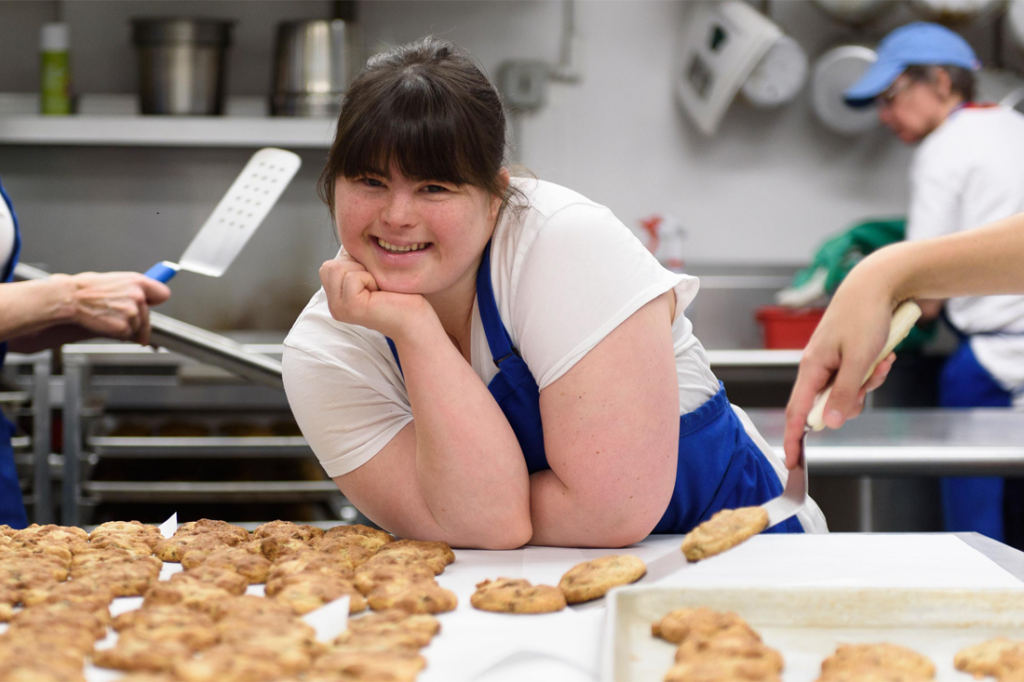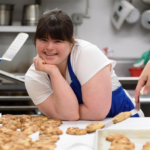Entrepreneurship can be a means to financial stability and fulfillment for some people with disabilities. They often turn to this alternative to traditional paid work when ableism excludes them from the workforce, as entrepreneurship grants them the flexible lifestyle they need.
People with disabilities create their own businesses at a higher rate than the general public, and many such entrepreneurs say that their life experiences grant them problem-solving capabilities, tenacity and innovation that primes them for entrepreneurship.

Here are five entrepreneurs with disabilities who’ve used their strengths to build businesses that serve their communities—and everyone else too.
Collette Divitto
When Collette Divitto started baking in high school, she immediately rose to the top of her class. Her mother, Rosemary Alfredo, had taken her out of traditional studies, believing that a specialized curriculum path that emphasized life skills like baking was more useful for Divitto, who was born with Down syndrome. After Divitto’s subsequent graduation from the college-level ClemsonLIFE program, she moved to Boston and started her job search, during which she repeatedly heard that she was “not a fit.”
She then sought a new path to the independent life she wanted through baking small batches of her chocolate chip cinnamon “amazing” cookies for her hometown grocery store. Since then, she’s sold about 900,000 cookies across the country through her business, Collettey’s.
Now at the age of 34, Divitto has also spoken on stages across the U.S., including for TEDx, and serves as the CEO of the nonprofit Collettey’s Leadership, through which she offers online lessons in independent living and entrepreneurship.
As much as she loves baking, she loves employing fellow people with disabilities more. “I love working with a team. That is actually the most important thing… because I really want to give them the best opportunities,” she says.
Alfredo, who works in business development, account management and media relations at Collettey’s, says that people with disabilities need a support system—much like any other entrepreneur who doesn’t have disabilities. She also observes how entrepreneurship gives people with disabilities “a feel[ing] of self-empowerment” that changes their lives.
“They get hooked on the self-empowerment, and then they get hooked on helping others because they never forget where they were and how much rejection they went through,” she says. “For Collette… she’s seen herself accomplish things in the nondisabled community, and because she’s seen that, she’s grown her confidence level…. She believes in herself now.”
Divitto is now collaborating with producers on the planned Rise: The Collette Divitto Story, a documentary that will be shown at IMAX theaters with the goal of redefining how society views disabilities and inclusion.
Alvaro Silberstein
Alvaro Silberstein had a simple dream: to hike Torres del Paine National Park in Patagonia, Chile. However, the native Chilean had more logistics to consider than the average hiker. A car accident at age 18 had left him with C5 quadriplegia—he’s paralyzed from his chest down and is a full-time wheelchair user. Refusing to let accessibility challenges keep him from traveling, he and his lifelong friend Camilo Navarro found a way to navigate the route by wheelchair and completed the trek.
Silberstein, a former management consultant, was already studying for his MBA at the University of California, Berkeley with the goal of becoming an entrepreneur to solve problems for other people with disabilities—and to tap into the global disability market, now estimated at $18.3 trillion. When his Torres del Paine trip went viral and requests for accessibility information began flooding in, the emerging entrepreneur saw an opportunity. He and Navarro founded Wheel the World in 2018 to “encourage others to explore the world without limits,” according to the company’s website.
Since then, the company has raised $10 million in funding, and more than 20,000 people have traveled and booked trips through the platform. Last year alone, 7,000 people traveled to more than 10 countries and 200 destinations in the U.S. thanks to the site’s accessibility information. Wheel the World has also introduced verified destinations, offering its seal of approval for hotels, restaurants and attractions based on more than 200 accessibility features.
Rather than simply announcing whether or not a destination is ADA accessible, Wheel the World posts specific data to allow travelers to make informed decisions about if a destination fits their needs.
“The reality is that accessibility is not binary,” Silberstein says. He provides the example that because of the type of wheelchair he uses, he can’t transfer independently into a bed that’s higher than 23 inches. However, a person with a different type of wheelchair might need a different bed height to complete the same task.
“We are going into that level of detail—measuring the height of the beds, the width of the doors, the height of the toilet, the type of shower,” he adds. “Many of those details are not required by the ADA.” The company now has more than 300 enrolled mappers around the world who log this type of information for other travelers.
“At first, my disability was a hard thing to accept for me, but through the process, it became a motivation for me to figure out how to be independent… how I would overcome my challenges and achieve my goals and dreams,” Silberstein says. “My passion was first, initially, on how I could replicate this, not only for myself but also to the community that I belong to—but after that, to build a business. Technology allows us today as entrepreneurs to provide great services that are focused on people with disabilities.”
John Cronin
When John Cronin, who was born with Down syndrome, graduated from high school, he says that the only options ahead of him were a quasi-day camp or working at places like Build-A-Bear. He didn’t like his choices. Instead, he wanted to start a business with his dad, Mark Cronin, a fellow entrepreneur. John’s penchant for colorful socks with fun graphic designs then led the duo to found John’s Crazy Socks.
The family’s business has now fulfilled more than 2 million sock orders. These include some of John’s own designs, like Down syndrome superhero socks, complete with capes on the back—which also happen to be his personal favorites.
John, who serves as chief happiness officer, inspires the company culture and is the face of the brand. He appears frequently on social media videos, the duo’s podcast and speaking stages across the U.S. “I’m famous,” John shrugs.
The company’s first employees were John’s classmates. “It’s a business owned by a person with different abilities. We should be hiring people with different abilities because we knew the problems John had in looking for work or finding good and meaningful work,” Mark says. “So that became natural for us, but it was born out of necessity.”
For their pick-and-pack warehouse, the duo hires people with different abilities, parents who are balancing duties at home and employees from a general labor pool. However, more than half of John’s Crazy Socks’ employees are people with disabilities. “By far the best labor pool [has been] the people with different abilities,” Mark says. “They want to be here. They’re enthusiastic. They’re focused on what they do. They’re productive. They do great work. So our experience is that hiring boosts morale, improves productivity [and] improves retention.” The Cronins have even shared their observations about their colleagues in a TEDx talk entitled “Hiring People With Differing Abilities Is Not Altruism—It Is Good Business.”
The social enterprise also donates funds to causes that the Cronins believe in, including pledging 5% of its earnings to the Special Olympics.
Ruby Taylor
When social worker Ruby Taylor experienced a traumatic brain injury from a car accident, the parents of the students she served came to her aid—they took her to lunch, to get groceries and to doctor’s appointments. They also helped her by delivering a message when she lost her job and was about to lose her home: She needed to get her finances in order. So they began teaching her.
The more she learned about investments and long-term interests, the more zealous she became. “I really began to dig deep into the stock market,“ she says. “And when I got back on my feet, I began to invest, and I saw my money grow. And I’m like, ‘If I can do this on a broken brain… there’s no reason why anyone can’t do it.’”
Her passion led her to found Financial Joy School, through which she levels the playing field so people who have historically been left out of investment conversations—including low-income individuals, people with disabilities, and Black and brown families—are empowered with financial knowledge. She also gamifies education through her LEGACY! card game, hosts online seminars and leads financial education summits to teach people to invest. She grew her business by tapping into training through the National Disability Institute and completing the accelerator at 2Gether-International, an entrepreneurship education organization for disabled founders.
When it comes to the stock market, “it doesn’t matter what color you are. It doesn’t matter about your gender…. The entry has been bust open,” Taylor says. “It’s the only democratized vehicle to build wealth. And anybody who wants to debate that, I will, stuttering and all,” she adds. “Bringing more people within the market is what my push is for creating a financially equitable world.”
A self-proclaimed “financial equalizer,” Taylor has worked with 30,000 families to teach them how to build generational wealth. “I would have never been able to touch that many families as just a school social worker,” she says. “What was once defeating [has] become purposeful, and so it drives me.”
Tiffani Martin
Could including the word “disability” in a LinkedIn bio bury a job seeker’s profile from recruiters? Could being a woman negatively affect someone’s ability to qualify for a mortgage because data only goes back to 1974, when women could begin borrowing in their own names? These are the types of questions developers are grappling with amid the rise of AI—which can be highly biased, according to the Center for Democracy and Technology.
Tiffani Martin, founder and chief executive officer at VisioTech, fights against this bias with the Accessible AI Quotient, which she helped design to assess whether AI technology is accessible and to promote inclusivity in AI development.
“Data is the fuel for technology and AI…. We know that comes with biases. [It’s] just the intrinsic nature of the society that we live in,” she says. “So we’re making sure—trying to make sure—that throughout the development life cycle… they are keeping in mind the full spectrum of diversity.”
Martin has persevered because she sees her efforts in technological accessibility as her legacy. She was diagnosed with juvenile diabetes at 5 years old, and due to what she calls poor management on her part, she later developed diabetic retinopathy. Then, she went blind at 27, around the same time that she also went on dialysis and temporarily lost her ability to walk. Though she received a kidney transplant, two years later—and just two months after she married her husband—her body rejected the kidney, which landed her in the hospital.
“It was during one of those hospital stints that I was like, ’You know, if I’m not going to be able to leave a legacy in the form of a child… [then] I want to leave something that will help other people,’” she recalls. “And I realized the key to help wasn’t necessarily a handout, but [a] hand up, and so it was access.… The biggest thing that kind of got me back in the game was technology.”
She founded VisioTech in the hospital. After that, making technology more accessible—as well as returning to her new husband—became her motivation. Though she originally formed the company to help companies with web and digital accessibility, it later pivoted to focus on AI as the technology grew.
According to Martin, the technology industry only stands to gain from founders like her who consider diversity across the board. “I cannot hide being Black. I cannot hide being a woman, and I cannot hide my disability,” she says. ”The systems and the powers that be right now don’t look like me. And so I think it’s important as an entrepreneur to proudly be in places—specifically [in] technology.
”I just find value in diversity,” she adds. ”I find value in different perspectives.”
Photo courtesy of Colletteys.com










